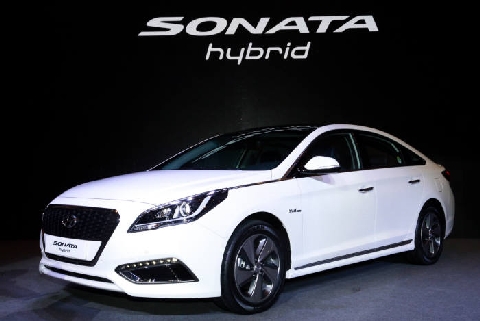Hyundai Motor Company will release the ‘New Sonata Hybrid’ with fuel economy improved by more than 8% and output, torque and CO2 emission performances innovated, and thus will strengthen its entry to the eco-friendly vehicle market. The New Sonata Hybrid marks a starting point for the lineup improvement for Hyundai Kia Motors, which is aiming to climb to the second position in the global eco-friendly vehicle market by 2020. In particular, the company’s goal is to change the paradigm in hybrid car market through technology innovation to improve fuel economy and engine performance concurrently. Hyundai Motor Company plans to sell the New Sonata Hybrid by a total of 55,000 domestically and internationally in the New Year.
Hyundai Motor Company (Chairman: Chung Mong-koo) held an event for the launch of the ‘New Sonata Hybrid’ at the Grand Intercontinental on the 16th and announced that it would start the sale of this new vehicle model.
For the New Sonata Hybrid, around KRW 180 billion was invested as a development cost during the R&D period of approximately 27 months. For the development, a focus was placed on fuel economy improvement, the biggest merit of hybrid models.
Hyundai Motor Company achieved the fuel economy of 18.2km/ liter (based on a 16” tire, 17.7km/ liter for a 17” tire) through appropriate power distribution between the engine and the motor and regenerative braking system efficiency improvement. This is an improvement by 8.3% from the existing products (17” Tire: 5.3%). As such, the New Sonata Hybrid has a higher economic value than other hybrid models of the same class. In addition, the lithium ion polymer battery capacity was increased from the existing 1.43kWh to 1.62kWh, and thus the electric vehicle (EV) mode efficiency was improved.
“While eco-friendly vehicles are emerging as a mainstream in the global automotive market, we released the New Sonata Hybrid armored with the top-level fuel economy among vehicles in the same class and a powerful driving performance,” said Vice President Gwak Jin. “It will activate Korea’s eco-friendly vehicle market and lead the popularization of hybrid cars.”
Following the 1st generation model (Sonata Hybrid), Hyundai Motor Company again applied the independently developed ‘parallel hard-type hybrid system’ to the new model. This system has a simpler structure and greater efficiency that the combined hard-type hybrid system of Toyota and GM.
In particular, the New Sonata is mounted with the Nu 2.0 gasoline direct injection (GDI) hybrid engine developed with the company’s own technologies. With the maximum output of 156 horsepower and maximum torque of 19.3kg?m, which were improved by 4% and 5.5% respectively from the existing products, the New Sonata Hybrid produces the highest power performance among vehicle models in the same class. In addition, as for the 39kW hard-type electric motor that handles output generation together with the engine, the output has been improved by 8.6% from the previous models. At the same time, it produces powerful driving performance with the maximum torque of 20.9kg?m.
Hyundai Motor Company Executive Director Lee Gi-sang (Director of Environmental Technology Center) said, “Following the release of the New Sonata Hybrid, Hyundai Motor Group will exert the utmost to increase the eco-friendly vehicle lineups up to 22 and to climb to the second position in the global eco-friendly vehicle market by 2020.”
Hyundai Motor Company’s goal is to release the New Sonata Hybrid in the key countries including the U.S. from the first half of next year, and thus to sell it by a total of 55,000, such as 18,000 in Korea and 37,000 abroad.
The New Sonata Hybrid also lowers consumers’ price burden. The prices of the Smart model and the Modern model have been set as KRW 28.7 million and KRW 29.95 million, which are lower by KRW 250,000 and KRW 130,000 than the previous models respectively, and the Premium model is priced at KRW 32 million, which is the same as of the previous model (after individual consumption tax and education tax reduction). According to a Hyundai Motor source, consumers purchasing the New Sonata Hybrid benefit from a maximum acquisition tax reduction by KRW 1.4 million during the vehicle registration and also an exemption in the bond purchase for up to KRW 2 million, and thus, considering the actual vehicle acquisition cost, the price competitiveness of the New Sonata Hybrid is further enhanced.
Yang Jong-seok | jsyang@etnews.com
